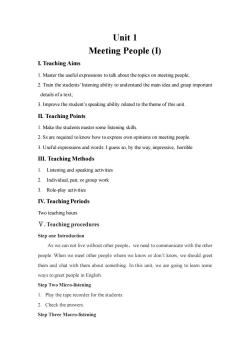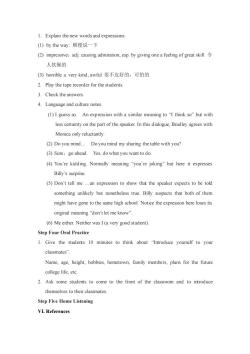《大学英语读写》课程教学资源(听说一级教案)Unit 1 Meeting People(I)

Unit 1 Meeting People(I) I.Teaching Aims 1.Master the useful expressions to talk about the topics on meeting people; 2.Train the students'listening ability to understand the main idea and grasp important details ofa text. 3.Improve the student's speaking ability related to the theme of this unit II.Teaching Points 1.Make the students master some listening skills. 2.Ss are required to know how to express own opinions on meeting people. 3.Useful expressions and words:I guess so,by the way,impressive,horrible III.Teaching Methods 1.Listening and speaking activities 2.Individual,pair,or group work 3.Role-play activities IV.Teaching Periods Two teaching hours V.Teaching procedures Step one Introduction As we can not live without other people,we need to communicate with the other people.When we meet other people whom we know or don't know,we should greet them and chat with them about something.In this unit,we are going to leamn some ways to greet people in English Step Two Micro-listening 1.Play the tape recorder for the students. 2.Check the answers. Step Three Macro-listening
Unit 1 Meeting People (I) I. Teaching Aims 1. Master the useful expressions to talk about the topics on meeting people; 2. Train the students’ listening ability to understand the main idea and grasp important details of a text; 3. Improve the student’s speaking ability related to the theme of this unit. II. Teaching Points 1. Make the students master some listening skills. 2. Ss are required to know how to express own opinions on meeting people. 3. Useful expressions and words: I guess so, by the way, impressive, horrible III. Teaching Methods 1. Listening and speaking activities 2. Individual, pair, or group work 3. Role-play activities IV. Teaching Periods Two teaching hours Ⅴ. Teaching procedures Step one Introduction As we can not live without other people,we need to communicate with the other people. When we meet other people whom we know or don’t know, we should greet them and chat with them about something. In this unit, we are going to learn some ways to greet people in English. Step Two Micro-listening 1. Play the tape recorder for the students. 2. Check the answers. Step Three Macro-listening

1.Explain the new wordsand expressions ()by the way:顺便说一下 (2)impressive:adj.causing admiration,esp.by giving one a feeling of great skill 人钦佩的 (3)horrible a.very kind,awful很不友好的,可怕的 2.Play the tape recorder for the students. 3.Check the answers 4.Language and culture notes. (1)I guess so.An expression with a similar meaning to"I think so"but with less certainty on the part of the speaker.In this dialogue.Bradley agrees with Monica only reluctantly (2)Do you mind...Do you mind my sharing the table with you? (3)Sure,go ahead.Yes,do what you want to do. (4)You're kidding.Normally meaning "you're joking"but here it expresses Billy's surprise. (5)Don't tell me...an expression to show that the speaker expects to be told something unlikely but nonetheless true.Billy suspects that both of them might have gone to the same high school.Notice the expression here loses its original meaning“don't let me know”. (6)Me either.Neither was I(a very good student). Step Four Oral Practice 1.Give the students 10 minutes to think about "Introduce yourself to your classmates”. Name,age.height,hobbies,hometown,family members,plans for the future college life,etc. 2.Ask some students to come to the front of the classroom and to introduce themselves to their classmates. Step Five Home Listening VI.References
1. Explain the new words and expressions (1) by the way: 顺便说一下 (2) impressive:adj. causing admiration, esp. by giving one a feeling of great skill 令 人钦佩的 (3) horrible a. very kind, awful 很不友好的,可怕的 2. Play the tape recorder for the students. 3. Check the answers 4. Language and culture notes. (1) I guess so. An expression with a similar meaning to “I think so” but with less certainty on the part of the speaker. In this dialogue, Bradley agrees with Monica only reluctantly. (2) Do you mind… Do you mind my sharing the table with you? (3) Sure,go ahead. Yes, do what you want to do. (4) You’re kidding. Normally meaning “you’re joking” but here it expresses Billy’s surprise. (5) Don’t tell me …an expression to show that the speaker expects to be told something unlikely but nonetheless true. Billy suspects that both of them might have gone to the same high school. Notice the expression here loses its original meaning “don’t let me know”. (6) Me either. Neither was I (a very good student). Step Four Oral Practice 1. Give the students 10 minutes to think about “Introduce yourself to your classmates”. Name, age, height, hobbies, hometown, family members, plans for the future college life, etc. 2. Ask some students to come to the front of the classroom and to introduce themselves to their classmates. Step Five Home Listening VI. References

1.《大学英语听说》(学生用书),虞苏美,李慧琴主编,上海:上海外语教育出 版社,2006 2.《大学英语听说》(教师用书),虞苏美,李慧琴主编,上海:上海外语教育出 版社,2006 3.An Advanced English Grammar.薄冰主编.北京:高等教育出版社,1996. 4.牛津高阶英汉双解词典(第六版).牛津大学出版社,2004
1.《大学英语听说》(学生用书),虞苏美,李慧琴主编,上海:上海外语教育出 版社,2006. 2.《大学英语听说》(教师用书),虞苏美,李慧琴主编,上海:上海外语教育出 版社,2006. 3. An Advanced English Grammar. 薄冰 主编. 北京:高等教育出版社,1996. 4. 牛津高阶英汉双解词典(第六版). 牛津大学出版社,2004
按次数下载不扣除下载券;
注册用户24小时内重复下载只扣除一次;
顺序:VIP每日次数-->可用次数-->下载券;
- 山西农业大学:《植保专业外语》课程教学资源(电子教案,授课教师:郝赤).doc
- 天津开放大学:《日语》课程教学资源(辅导资料)课程说明_日语(1).doc
- 天津开放大学:《法语》课程教学资源(学习资料)课程教学大纲_法语(1).doc
- 天津开放大学:《法语》课程教学资源(学习资料)讲法语的42个国家与地区_法语(1).doc
- 天津开放大学:《法语》课程教学资源(学习资料)考核说明_法语(1).doc
- 天津开放大学:《日语》课程教学资源(辅导资料)考核说明_日语(1).doc
- 天津开放大学:《日语》课程教学资源(辅导资料)考核说明_日语(2).doc
- 天津开放大学:《法语》课程教学资源(学习资料)第四章辅导_法语(1).doc
- 天津开放大学:《法语》课程教学资源(学习资料)第四次形考作业讲评_法语(2).doc
- 天津开放大学:《法语》课程教学资源(学习资料)第四次形考作业讲评_法语(1).doc
- 天津开放大学:《法语》课程教学资源(学习资料)第四次形考作业_法语(2).doc
- 天津开放大学:《法语》课程教学资源(学习资料)第十章辅导_法语(1).doc
- 天津开放大学:《法语》课程教学资源(学习资料)第十四章辅导_法语(1).doc
- 天津开放大学:《法语》课程教学资源(学习资料)第十八章辅导练习题答案_法语(2).doc
- 天津开放大学:《法语》课程教学资源(学习资料)第十八章辅导_法语(2).doc
- 天津开放大学:《法语》课程教学资源(学习资料)第十五章辅导练习题答案_法语(1).doc
- 天津开放大学:《法语》课程教学资源(学习资料)第十五章辅导_法语(1).doc
- 天津开放大学:《法语》课程教学资源(学习资料)第十二章辅导_法语(1).doc
- 天津开放大学:《法语》课程教学资源(学习资料)第十九章辅导_法语(2).doc
- 天津开放大学:《法语》课程教学资源(学习资料)第十三章辅导_法语(1).doc
- 《大学英语读写》课程教学资源(听说一级教案)Unit 10 Daily Activities(II).doc
- 《大学英语读写》课程教学资源(听说一级教案)Unit 11 Dining Out(I).doc
- 《大学英语读写》课程教学资源(听说一级教案)Unit 12 Asking the Way(II).doc
- 《大学英语读写》课程教学资源(听说一级教案)Unit 13 Shopping(I).doc
- 《大学英语读写》课程教学资源(听说一级教案)Unit 14 Shopping(II).doc
- 《大学英语读写》课程教学资源(听说一级教案)Unit 15 Description(I).doc
- 《大学英语读写》课程教学资源(听说一级教案)Unit 2 Unit 2 Meeting People(II).doc
- 《大学英语读写》课程教学资源(听说一级教案)Unit 3 Unit 3 Study(I).doc
- 《大学英语读写》课程教学资源(听说一级教案)Unit 4 Unit 4 Study(II).doc
- 《大学英语读写》课程教学资源(听说一级教案)Unit 5 Apologies(I).doc
- 《大学英语读写》课程教学资源(听说一级教案)Unit 6 Apologies(II).doc
- 《大学英语读写》课程教学资源(听说一级教案)Unit 7 Asking the Way(I).doc
- 《大学英语读写》课程教学资源(听说一级教案)Unit 8 Asking the Way(II).doc
- 《大学英语读写》课程教学资源(听说一级教案)Unit 9 Daily Activities(I).doc
- 《大学英语读写》课程教学资源(听说一级教案)Unit 16 Unit 16 Description(II).doc
- 《大学英语读写》课程教学资源(听说二级教案)Topic 1 Telephoning.doc
- 《大学英语读写》课程教学资源(听说二级教案)Unit 3 giving advice(I).doc
- 《大学英语读写》课程教学资源(听说二级教案)Unit 7 & 8.doc
- 《大学英语读写》课程教学资源(听说二级教案)Unit 9 & 10 Seeing the Doctor.doc
- 《大学英语读写》课程教学资源(听说二级教案)Unit 13 Dating(I).doc
